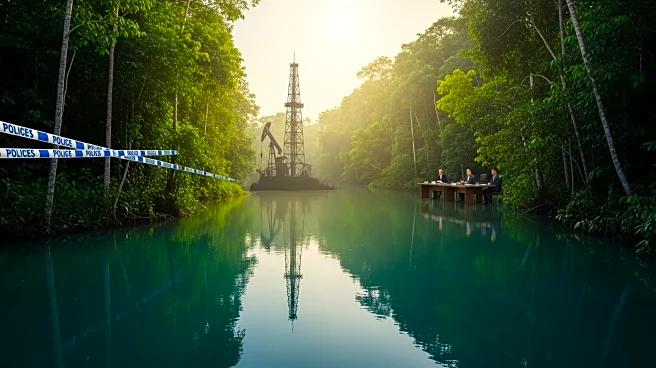What's Happening?
Petrobras, Brazil's state-controlled energy company, has received approval to drill an exploratory oil well in the Foz do Amazonas basin near the Amazon River. This decision follows a prolonged standoff
with environmental regulators. The drilling is set to commence immediately, with a projected duration of five months. The approval comes as Brazil prepares to host the UN climate conference, COP30, highlighting the country's dual focus on economic growth and environmental stewardship. Despite environmentalists' warnings about potential oil spills threatening the Amazon's ecosystem, Petrobras and other major oil companies, including Exxon Mobil and Chevron, have secured exploration rights in the area.
Why It's Important?
The approval for oil exploration near the Amazon River is significant for Brazil's energy strategy, as it seeks to balance economic growth with environmental protection. The Foz do Amazonas basin is seen as a promising offshore oil region, crucial for Brazil's energy sovereignty. However, environmentalists express concerns about the potential impact on the Amazon's delicate ecosystem and indigenous populations. The decision underscores Brazil's competing priorities of economic development and environmental conservation, especially as the country hosts COP30, a major climate conference.
What's Next?
Petrobras plans to begin drilling immediately, with a focus on emergency response strategies to mitigate environmental risks. The Brazilian Institute of Environment and Renewable Natural Resources has emphasized improvements in the project's emergency response structure. As drilling progresses, further environmental assessments and simulations will be conducted to address wildlife response strategies. The outcome of this exploration could influence Brazil's long-term energy policy and its role in global climate discussions.
Beyond the Headlines
The exploration in the Foz do Amazonas basin could have long-term implications for Brazil's oil industry, which faces challenges due to disappointing exploration results in other regions. The success of this project may determine Brazil's future as an oil producer and its potential shift towards becoming a net importer. The decision also raises ethical questions about prioritizing economic interests over environmental protection, especially in ecologically sensitive areas.










